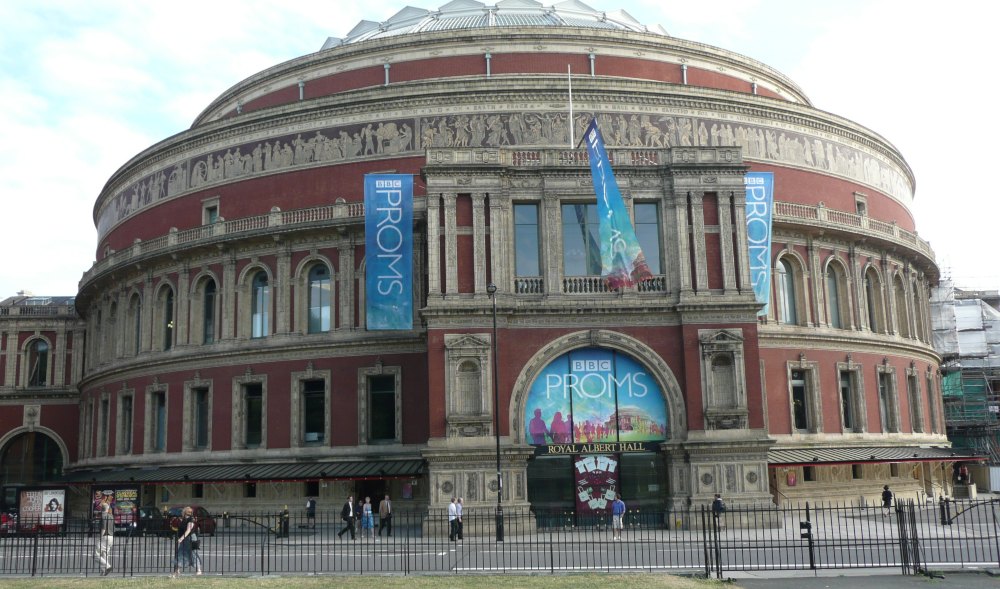
The BBC’s justifiably famous summer Promenade Concert Festival (The Proms) is held in London’s huge Albert Hall. Last year, all the concerts were broadcast but because of the Covid pandemic there were no public audiences in the hall, and orchestras tended to be small so they could socially distance on the stage.
For this year’s festival the hall is now open to the public and the concerts are attended by several thousand enthusiasts, who are required to show proof of double Covid vaccination or a recent negative test. The stage has been extended so that orchestras can be full size with all the players social distancing. The musicians are more separated than normal, but the hall’s superbly rich and resonant acoustics still provide a unified and clear sound. So for this years’ festival the BBC has skillfully and responsibly combined the restoration of full and powerful public music-making with continued Covid precautions and public health concerns. I am happy to have attended several concerts already.
The range of performers is characteristically wide. In the over 40 daily concerts between 30 July and 11 September there are 26 different orchestras, 36 different conductors, and even more soloists. A major difference from past years is that with one exception all the orchestras are British-based because of the pandemic’s international travel restrictions. (The exception is the Italy-based Mahler Chamber Orchestra.) If and when the pandemic and its associated restrictions go away it will be interesting to see whether Brexit stops or limits orchestra visits from the European Union.
The range of music is even wider. The great classical figures and established 20th century geniuses are fully covered. There are also around 20 modern composers whose works include some half a dozen new commissions by the BBC. Geographical, gender and ethnic diversity in composers and performers is also notable. Composers include Britons Ruth Gipps and Laura Jurd, the South Korean Unsuk Chin, and Americans Nico Muhly, Gershwin, Richard Rodgers, Florence Price, and Samuel Coleridge Taylor. There are significant women conductors, not least the brilliant Finnish Dalia Staveska, the Principal Guest conductor of the BBC Symphony, and Mirga Gražinytė-Tyla, the Lithuanian chief conductor of the City of Birmingham Symphony.
The full program is available on the BBC website and all the concerts are streamed from BBC Radio 3 and remain globally accessible in audio versions until mid- October on BBC Sounds.
The opening concert on 30 July was conducted by the BBC Symphony’s Principal Guest Conductor Dalia Staveska. The pieces were Vaughan Williams “Serenade to Music,” set to Shakespeare’s poem, “How sweet the moonlight sleeps upon this bank!”, a new BBC commission by the Scottish Composer James Macmillan, and Sibelius’ Second Symphony. A televised performance of the beautiful Vaughan Williams Serenade from the 2019 Proms is accessible on YouTube.
The Macmillan work sets a Shelley poem, “Music when soft voices die vibrates in the memory,” used the same small chorus and soloists as Vaughan Williams and provided a moving and perfectly appropriate piece for the occasion. It was followed by Sibelius’ Second Symphony, which as his compatriot conductor said, starts somberly and equivocally but ends with joy and triumph.
So the BBC, the major British institution with a global reach, in its first 2021 Prom program in these very difficult times, provided wonderfully sensitive and touching words and music from British geniuses, and concluded with a complex and ultimately triumphant symphony. Among my six decades of concert experiences, this one will always “vibrate in my memory” along with other profound experiences such as Yehudi Menuhin playing Bach solo violin sonatas and partitas, Otto Klemperer conducting Beethoven’s Missa Solemnis, and Rostropovich conducting the Seattle Symphony in Tchaikovsky and Shostakovich.
Discover more from Post Alley
Subscribe to get the latest posts sent to your email.

Reading this report from London, I wonder anew why Seattle doesn’t take advantage of its cool, sunny summer weather and have more art in the fair weather. Some theater companies, such as ACT, used to focus on the summer, but now they are pretty much year-round. The Seattle Chamber Music Society used to have picnics on the lawn before their summer concerts (initially at Lakeside School), but now they are entirely indoors at Benaroya. The other big summer draw for the arts was the big production of Seattle Opera, every four years being the Wagner Ring Cycle. Now the Ring is history and the summer big deal is mostly just a regular September performance. Bumbershoot is in limbo.
Yet, there’s hope. Discussions are well along to convert the Memorial Stadium at Seattle Center to an outdoor performance venue and athletic field. And there will be a summer performance facility at the new central Waterfront Park.